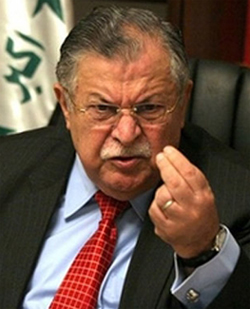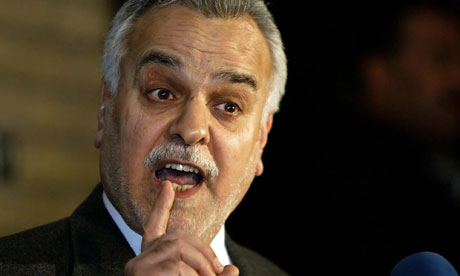 |
| President Jalal Talabani |
 |
| Prime Minister Nuri al-Maliki |
 |
| Rafa al-Issawi |
building and detained around 150 bodyguards who worked
for
Rafa al-Issawi, the chief minister for financial affairs and
one of the government’s
top Sunni officials. Shortly after,
news
broke out that the Shia led government was targeting
the staff of a top Sunni
politician. Upon hearing this,
thousands
of Iraqis from the Sunni heartland flocked
to the streets in protest. These were so large that
the major highway
connecting Baghdad to Jordan
and Syria
was completely shut down.
 |
| Vice President Tariq al-Hashimi |
This, however, wasn’t anything new
for the Sunni population. Last year,
they experienced something similar to this when Iraqi security forces arrested
several guards who worked for the Vice President Tariq al-Hashimi. After the confession of plotting terrorist
attacks, Hashimi fled the country to Turkey in order to avoid the death
sentence. Whether or not he was actually
guilty is irrelevant, though. What is
important is that a huge majority of the Sunni population viewed these arrests
as a carefully planned vendetta by a Shia led premier against the Sunni rival. The marginalization and alienation felt by the
Sunni’s when Saddam Hussein was overthrown was now being relived and
reinforced.
In the past, the U.S. and President Talabani were
able to suppress those feelings until that current crisis needed intervention. With the U.S.
no longer present and Talabani recovering from his stroke in a German hospital,
Iraq
must find someone who can perform this difficult task. I think in an ideal world, al-Maliki would
fill the spot himself, however, with protests continuing and the prime minister
reluctant to back down, it is quite unlikely this will actually happen.
You have a good point about the ethnic conflict and how the current prime minister probably won't be able to solve it. Iraq is still very far from being a stable Democracy, hopefully it does not regress into violent conflict again.
ReplyDeleteIt doesn't seem plausible for Iraq to find another leader to lead Iraqi's in the direction of progress in a timely fashion we would like. Although, it would be nice for Iraq to find someone who can solve its problems. Instead, other ways to mitigate these sectarian divisions need to be established. I do not have the answers to so this, but acknowledging the existence of these different sects and the desire for engagement to cooperate with one another is fundamental. This could be a start, but how can we really see results after such a long history of animosity?
ReplyDeleteThis case is striking to me because of how similar it compares to my case study country, Mali. In Mali the conflict originally started out as issues between the country's two major ethnic groups which led to issues in how the state was ruling the country and then international intervention. I feel that Iraq is really similar to this because the divide between the Sunni and Shiite religious groups led to internal conflict, issues within the state, and international intervention by the US. However, in both Iraq and Mali the international actors, France and the US, stepped in to re-establish a "functioning" state but did little to help work with the underlying ethnic or religious issues of grievances for underrepresented groups in society. Thus, even after the US left Iraq and when France leaves Mali the issues still exist under the surface and there is a major risk of another outbreak of conflict.
ReplyDeleteI think this post really shows how difficult the road for Iraq will be in regards to finding a leader that works for them as well as maintaining the democracy that the U.S. had hoped for them.
ReplyDeleteThis post highlights the aftermath problems of intervention by the international community. This is a major reason why in the instance of Syria, for example, we see hesitation from the international community. In Mali as well, with the end of French military involvement predictions show that stability looks uncertain in that country as well
ReplyDeleteWhile I understand why the Sunni population is revolting due to the fact that they're the majority. Yet, does it concern anyone that its very well possible that Sunni-led parties, as is the case in Syria, may have connections with Al Qaeda and other fundamentalist groups?
ReplyDeleteThis is an eye opening article as I wasn't aware that Iraq was between a rock and hard place like described in the article with conflict between Sunni and Shia posing danger for Iraq's stability. With out the United States keeping watch and being there to help, I can foresee conflicts and more violence occurring in the government in the months to come which means that all the hard work to stabilize Iraq will slowly vanish. Although it is not the United States' job to police and hold up a country like Iraq, it will a serious problem if corruption and fighting within the government between officials and between the Sunni and Shia causes Iraq to succumb to the same failure and uproar that countries in the Arab spring like Syria endured. If Iraq cant get their leadership and inter-country relations under control and they fall due to these boiling problems, it will just increase tension and pressure in the MENA region and pose more risk for the rest of the world. Keeping at least some of countries in the middle east not corrupt and stable is dire for recovery of the region.
ReplyDelete